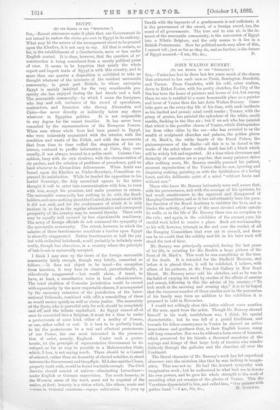EGYPT.
[TO THE EDITOR OR THE " BPEOTATOR."] Sta,—Recent utterances make it plain that our Government do not intend to restore the status quo ante in Egypt in its entirety. What may laZi the nature of the arrangement about to be pressed upon the Khedive, it is not easy to say. All that is certain, so far, is the establishment of a Gendarmerie, more or less under English control. It is clear, however, that the question of re- construction is being considered from a merely political point of view. It seems to be forgotten that nearly the whole export and import trade of Egypt is with this country, and in more than one quarter• a disposition is exhibited to take no thought whatever of the interests of the resident mercantile community, in great part British, to whose enterprise Egypt is mainly indebted for the very considerable pro- sperity she has enjoyed during the last decade and a half. The .mercantile community—by which I mean • the foreigners who buy and sell, exclusive of the orowd of speculators, contractors, and financiers who throng Alexandria and Cairo—has never• directly . or indirectly taken any share whatever in Egyptian politics. It is not responsible in any degree for the recent troubles. It has never been consulted by the representatives of the European Powers. When men whose whole lives had been passed in Egypt, who were intimately acquainted with the interior, with the condition and wants of the Fellah, and with the movements that from time to time ruffled the stagnation of his ex- istence, ventured to proffer information at Cairo, they were usually, if not always, treated to a polite snub. Cairene Con- suldom, busy with its own rivalries, with the circumvention of sly pashas, and the solution of problems of precedence, paid no heed whatever to Alexandrian deliver•auces. When Arabi was forced upon the Khedive as Under-Secretaiy, Consuldom ex- pressed its satisfaction. While he headed the opposition to his lawful Sovereign, the duly accredited agents to the latter thought it well to enter into communication with him, to treat with him, accept his promises, and make promises in return. The mercantile community has nothing to do with the Bond- holders, and cares nothing about the Control, the creation of which it did not seek, and for the continuance of which it is only anxious in so fax as the regular administration and consequent prosperity of the country may be assured thereby. These ends may be equally well assured by less objectionable machinery. The army of foreign officials do not command the sympathy of the mercantile community. The extent, however, to which the salaries of these functionaries constitute a burden upon Egypt is absurdly exaggerated. Native functionaries at half the pay but with unlimited baksheesh, would probably be infinitely more costly, though less obnoxious, in a country where the principle of baksheesh is universally accepted.
I think I may sum up the views of the foreign mercantile community fairly enough, though very briefly, somewhat as follows :—It does not object to be taxed—the exemption from taxation, it may here be observed, parenthetically, is ridiculously exaggerated —but would claim, if taxed, to have, at least, a consultative voice in local administration. The total abolition of Consular jurisdiction would be viewed with equanimity by the more respectable classes, if accompanied by the necessary extension of the jurisdiction of the Inter- national Tribunals, combined with sifeh a remodelling of these as would ensure speedy as well as cheap justice. The suzerainty of the Porte, who is powerful only for evil, should be completely cast off, and the tribute capitalised. As Egypt cannot all at once he converted into a Belgium, it must for a time be under a •protectorate of some kind, either of a medley of Powers, or one, either veiled or real. It is best to be perfectly frank, to let the protectorate be a real and effectual protectorate of one Power, the one most interested in the preserva- tion of order, namely, England. Under such a protec- torate, let the principle of representative Government be de- veloped, as far as may be possible in a Mahommedan State, which, I fear, is not saying much. There should be a Council of selected, rather than an Assembly of elected notables, to stand between the Government and the petple. El Azhar and the Ulerna, properly dealt with, would be found tractable enough. The Civil Service should consist of natives--eliminating Levantinea- under English or German supervision. Too much honesty, in the Western sense of the word, must not be required of the native, at first; honesty is a virtue which, like others, needs and —even in Oriental countries—repays cultivation. To prop up
Tewlik with the bayonets of a gendarmerie is not sufficient; it is the government of the sword, of a foreign sword, too, the worst of all governments. The true end to aim at, in the in- terest of the mercantile community, is the conversion of Egypt into a Nilotic Belgium, and the only means to it lies in a British Protectorate. How far political needs may allow of this,. I cannot tell; just so far as they do, and no•farther, is the future.
of Egypt assured.—I am, Sir, &c., D.


































 Previous page
Previous page